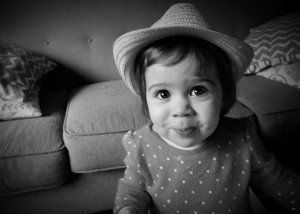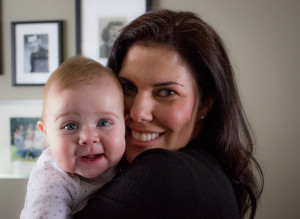After nearly 24 hours, we finally landed in Havana. It was May of 1998, the summer after I’d completed my sophomore year in college, when I accompanied my mother back to her homeland, an island she hadn’t seen since 1971 when she boarded a plane as part of the Freedom Flight program. Our multi-stop journey — Los Angeles to Houston to Cancun to Havana — was made with each of us wearing several layers of clothing, all of which we would leave behind. That’s what you did when you visited family in Cuba.
Exhausted, we stood before an inspector who began to pick apart our luggage, item by item, all of which Mom had carefully selected and weighed, because the rule was if you were over the weight allotment, they would require some kind of remittance. Knowing this, Mom slipped our inspector a twenty dollar bill, and just like that, we were allowed to move forward.
Just on the other side of the makeshift cordoned off area for those waiting, was our family—the real people whose names and faces I’d only known through photographs and stories that occasionally worked themselves from my mother’s memory. After a round of hearty hugs, Mom and I were ushered into a relic of a car and off to her cousin’s apartment. With the windows down (the AC had long since stopped working), we drove through the damp Caribbean air under a silken evening sky. I found it hard to believe we were actually here; we were in Cuba, finally. It wasn’t a mythical land about which was sung to me through lyrics from my mother’s albums. This place was in fact real. I let my head lean against the doorframe and listened to the salty waves crashing against the stone walls along the famous stretch of Malecon that held up this crumbling city.
We spent two weeks in Cuba, visiting with family and taking in as much as we could. I got to see the elementary school Mom attended, and the apartment where she had lived with her own mother. Everywhere we went we were treated like royalty—brought to tables bowing under the weight of feasts prepared. Someone had gotten wind that I loved mangoes, so at every stop there was always plenty of fresh mango, the flesh of the bright orange fruit so sweet that it could have only ripened under an island sun. We walked through abandoned sugar factories, gnawing on the raw cane. There were trips to swimming pools, and dinner dances at rooftop bars. Music and laughter was never far from our ears and lips, and someone was always telling me a story of when my mother was a little girl. This woman I had only ever known as my mother, a figure I often worked hard to steer against as a teenager, took on a new light. She had a history that was all her own, one apart from mine. For the first time I saw her as an individual.
My favorite memory rests with the particular leg of the trip that took us to Camaguey, the town from which Mom came. We were sitting in the backyard of someone’s house, most of the women busying themselves with putting the meal together, while the men were planted in a circle, passing around the two bottles of rum we had purchased with our American dollars at the local store. There was the sound of glass clinking as someone poured himself another swig, callused farm-worked hands rubbing scruffy cheeks, and laughter. There was so much laughter. At some point someone arrived with an accordion, and the group broke into a spontaneous rendition of Guantanamera. I know the lyrics because I grew up with them, Mom singing the song at parties, or turning up the stereo if the track came through the speakers. I knew Guantanamera, and I felt part of these people, this island, this place. I sang with them, our arms interlocking with one another, feet tapping in rhythm, the accordion scissoring its soulful notes through the heavy afternoon air.
The toothy smiles, the plumes of dust kicked up by our dancing heels in the backyard of our cousin’s house, the smell of stewing goat meat on the open fire in a makeshift shack of a kitchen. That scene has been stitched into my history and I often wonder what will happen to our connection with Cuba when my mother is gone. She is the last true link to the island, and all the history that lies with those people, the ones with whom we danced and sang.
 My own daughter, Lucille, was born in October of 2013. Weeks into her new life, my rawness into Motherhood, I discovered that if I wore her strapped to my chest and played music, her screams would calm as she became lulled by the rhythm of my dancing body. Often, the music I played was Cuban. I recently posted a picture of my daughter wearing a woven fedora. The caption read, Ella no nacio en Cuba, pero la isla vive en su corazon. Translation: She wasn’t born in Cuba, but the island lives in her heart. It’s in her smile — the one I gave her —the food I make, the music we listen to, and the intangible way my mother has taught me to live life. And now this breathes in Lucy, stitched in the fabric of her flesh, in all the ways that can be seen and unseen.
My own daughter, Lucille, was born in October of 2013. Weeks into her new life, my rawness into Motherhood, I discovered that if I wore her strapped to my chest and played music, her screams would calm as she became lulled by the rhythm of my dancing body. Often, the music I played was Cuban. I recently posted a picture of my daughter wearing a woven fedora. The caption read, Ella no nacio en Cuba, pero la isla vive en su corazon. Translation: She wasn’t born in Cuba, but the island lives in her heart. It’s in her smile — the one I gave her —the food I make, the music we listen to, and the intangible way my mother has taught me to live life. And now this breathes in Lucy, stitched in the fabric of her flesh, in all the ways that can be seen and unseen.
We are always there.
* * * * *
 “Mi Tierra” was written by Ilene Marshall. Ilene resides in Pittsburgh, PA, with her husband and daughter. When she’s not documenting her life through photography, she attempts to capture some of it in writing. She has been a teacher for 11 years, but finds that often times, the biggest lessons aren’t found in books. Ilene blogs at “These Marmalade Skies,” and her photography can be seen at Ilene Marshall Photography.
“Mi Tierra” was written by Ilene Marshall. Ilene resides in Pittsburgh, PA, with her husband and daughter. When she’s not documenting her life through photography, she attempts to capture some of it in writing. She has been a teacher for 11 years, but finds that often times, the biggest lessons aren’t found in books. Ilene blogs at “These Marmalade Skies,” and her photography can be seen at Ilene Marshall Photography.
I liked your history, is very nice. It is very wonderfull and i dont now your vistited to Cuba you liked it. I spoke whith your mam, and asked about to you and your brother. I liked the picture that your kid. Apologise my inglish. Write by hiar.
Thank you for gracing us with this beautiful story.
Oh, Ilene. I am astounded. Great images mixed with beautiful reflections.
Thanks, Jen! That means a lot coming from you.
Ilene, there are so many beautiful scenes and realizations in this piece! I loved watching Cuba come alive to you, as a real place with real people, beyond the stories and songs you heard as a child. I also loved your articulation of this universal realization:
“This woman I had only ever known as my mother, a figure I often worked hard to steer against as a teenager, took on a new light. She had a history that was all her own, one apart from mine. For the first time I saw her as an individual.”
Isn’t “place” an amazing, powerful thing?!?
Yes, so incredibly powerful, and not just in the tangible but in so many other ways. Thank you, Kristin.
Ilene I was born and rise in Camaguey in the same block as your mother home we were childhood friends and remain friends true the years, my mom was also very good friends with your grandmother, I am amaze to see how you expres yourself about our Cuba even when you were born in the State, you capture the essence and flavor of our people our home were our heart and soul will always stay you writing is beautiful I enjoyed. I myself just spend two weeks there. I am happy to be back home with my family but I brought back my beautiful Camaguey in my heart